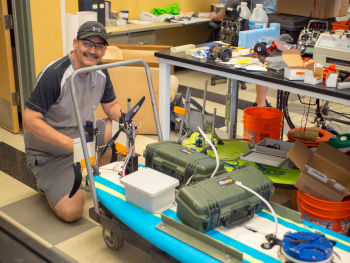
School:
Grade Level:
Teaching Position:
Supervisor:
Department:
Mentor:
Research Project Year:
Research Project Title:
Research Project Description:
Oceanic coastal currents supply a kelp ecosystem with nutrients, planktonic food, and larvae. Data on changes in coastal currents due to interactions with the kelp ecosystem are limited. Jackson and Winant (1983) found that water flow on the outside edge of a kelp forest is faster flowing than water on the interior. Although they did not determine the exact flow field through the entire kelp ecosystem, a large kelp forest and higher plant density will decrease the flow rate and increase the time before water reaches the interior kelp from outside.
Studying the currents in a kelp ecosystem is difficult for several reason: a) boats and crew with equipment are expensive; b) boats get tangled in the kelp; c) mounting measuring equipment within a kelp forest limits data to specific sites within the kelp forest and does not acquire data from the entire flow field; and d) stationary equipment requires constant maintenance from fouling organisms.
Therefore, the purpose of this research project is to test the viability of using a stand-up paddle (SUP) board to glide over the kelp ecosystem with an onboard Acoustic Doppler Current Profiler (ADCP) to map and generate data on the shallow water currents in a kelp ecosystem. Specific areas of focus during this research project included: designing and building an Automatic Position Receiving System (APRS) which would deploy if the SUP flipped over in rough weather conditions, designing and improving the ailerons and add rudders to improve the path profile of the SUP in windy and rough conditions and design and installation of onboard warning signal lights and waterproof onboard system connections.
